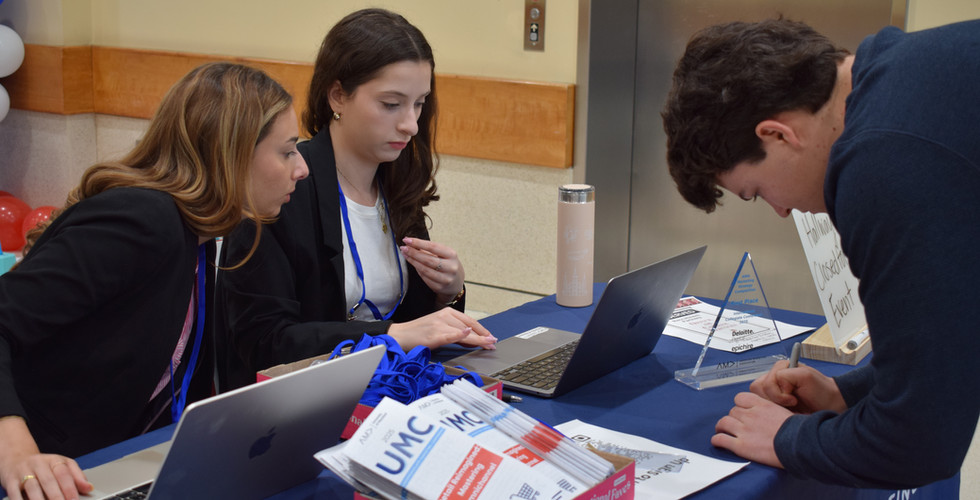UMC 2025: Retail Reimagined- Mastering Omnichannel
- AMA Web Team

- Apr 12, 2025
- 7 min read
Updated: May 6, 2025
Last Friday, UMD AMA hosted the annual Undergraduate Marketing Conference, centered around this year’s theme: Retail Reimagined - Mastering Omnichannel. The event featured five speakers, three exciting competitions, and so much marketing insight!
Keynote Speaker: The Future of Retail Marketing - Omnichannel Retail
To kick off UMC, guests had the opportunity to listen to and engage with the Keynote Speakers, Kelly Stipa, and Christian Castro, in a presentation on the Future of Retail Marketing from Flywheel Digital. Kelly, a Senior Business Manager at Flywheel, and Christian, a Senior Media Manager, were both of the first 100 employees at Flywheel, which is now a global company.
What is Flywheel Digital?
Flywheel Digital is a cloud-based digital commerce company that provides services to help the world's leading brands accelerate growth in digital retail. Headquartered in Baltimore, Flywheel Digital has a vast global footprint and works with half of the world’s 100 largest CPG brands.
Retail Media Industry Growth
The retail media industry has experienced explosive growth, with spending rising from $1 billion to $30 billion in just two decades. With consumer behavior shifting and the majority of consumers no longer following linear paths to purchase, retail media has become a vital component of digital commerce execution. However, this digital expansion comes with rising costs associate with e commerce (shipping, infrastructure, technology, and operations), leading retailers to diversifying their ecosystems and rely more heavily on advertising to drive revenue.
The Selling Equation
The selling equation, as explained by Flywheel Digital, is simple but powerful and is the basis for how brands turn shopping into sales:
Glance Views x Conversion Rate = Sales
This emphasizes the importance of advertising from the very first glance as data has shown that the time in which a consumer decides to make a purchase has become smaller and smaller, stressing the importance of getting eyes on your advertisements.
The Marketing Funnel
Retail media evolves into a strategic, data-driven, full-funnel approach of:
Awareness: Driving brand awareness and discovery
Consideration: Educate and Inform
Conversion: Creating a seamless shopper journey
Loyalty: Maintaining engagement
However, with the recent e-commerce landscape getting more complex by the day, the funnel is collapsing as purchasing is taking place a lot faster as people buy with less influence. Retailers are becoming media suppliers, and first-party data is now a high-value tool for targeting and personalizing.
From Basic Ads to AI-Powered Personalization
Flywheel Digital has experienced growth in the digital age which they've categorized into three phases:
Phase 1: The Early Days of Retail Media (Pre-2020)
Phase 2: Retailers marketing first part data (2020-2023)
Phase 3: The Era of Addressable Retail Media (2024-present)
Data is now being used to personalize shopping experiences for consumers, and AI and machine learning enable real-time personalized ads.
Moving up the Funnel: Connected TV
Connected TV is rapidly growing as an offsite advertising format, with big streaming networks being used to display ads. Companies like Prime Video are at the forefront of connected TV and demonstrate the different ways online retailers are collecting consumer data for services to deliver highly targeted ads.
Closed Loop Measurement: Amazon Marketing Cloud
Flywheel is #1 global user on Amazon Marketing Cloud (AMC), a secure, privacy-safe, cloud-based clean room where advertisers can perform analytics across pseudonymized signals. Clean rooms like AMC will only grow in importance with other brands following suit.
Insight: Leverage AMC to find consumers who exhibit the behavior you’re seeking
Audience: Build on audience of similar consumers in AMC
Action: Deliver campaigns to those users with display/video ads
AI Reshaping the Commerce Industry
AI is reshaping the digital market, and Agentic AI in particular is driving a major shift. We can expect a reduced reliance on traditional ad placements and a shift towards contextual, AI-driven commerce. As AI agents increasingly interact with ads on behalf of consumers, brands will need to rethink the way how they manage performance, measure success, and get ahead of AI tactics.
How Brands Can Prepare:
Optimize for AI-driven discovery
Rethink brand loyalty
Invest in Data
Explore AI-powered ad formats
Build direct AI integrations
Importance of In-store Media
Despite the digital age and modernization of shopping, 40% of shoppers still prefer to shop in-store. In-store media placements remain highly impactful especially as the path to purchase becomes smaller and smaller!
Panel: Omnichannel Bites - Serving Up the Future of Food Retail
In an industry where coffee is a common commodity, Compass Coffee is setting itself apart through the power of experience! Joel Shetterly, the head of marketing and design, and Gabby Levy, a member of the marketing team, shared their insight about the future of food retail and omnichannel marketing strategies at Compass Coffee. Compass Coffee is a popular coffee roaster based in Washington DC with 25 locations in and around the city. They even have a location right here in College Park!
Defining the Compass Experience
As a “non-differentiated” good or commodity, the coffee industry can be a challenging segment, but it is not just the coffee that keeps people coming back to Compass, rather the experience. Their goal is to transform a five minute cafe stop into a meaningful experience where everything just clicks. Through conscientious details like a warm barista interaction, fast service, and the perfect music, Compass Coffee aims to create an atmosphere that feels seamless and intuitive - all designed to make customers feel good.
What 'Omnichannel' Means to Compass Coffee
They described their approach as a "brand flywheel” consisting of a series of intentional channels including their cafes, retail coffee tins, grocery store features, e-commerce, and partnerships with restaurants across D.C. Each touchpoint is specific and carefully placed to reinforce brand quality and customer connection. A key takeaway? A great experience in one channel often drives performance in others!
The Role of AI in the Future of Omnichannel Retail
The rapid rise of technologies like AI is a major topic across the business world. Shetterly and Levy emphasized how it is vital to learn how to use these tools or quickly fall behind. Leveraging advancements like AI foster efficiency and are significant in better meeting evolving customer demands. From optimizing their website to streamlining projects, technology is used to enhance their work, not replace it.
How Physical Spaces Integrating with Digital Experiences
One of Compass’s strengths lies in seamlessly bridging the in-store and online experience. They aim to create warm, meaningful digital experiences that mirror the vibe of their cafes. This includes collaborating closely with customers and fans to create content, maintaining a tight-knit marketing team to collaborate effectively, and keeping their marketing authentic and organic!
At Compass Coffee, marketing isn’t about flashy tactics or intricate strategies. Instead, they focus on delivering exceptional customer experience and in return, everything else follows. Their advice to business? Focus on mastering human connection and truly knowing your customers, including their habits, routines, and needs. Use this insight to design with their experience in mind. Strategy is easy to talk about, but execution is what truly drives the results. Create content that resonates, communicate with purpose, and address customer needs. Finally, adapting to new technologies like AI is essential to staying ahead and optimizing the overall brand!
Q&A w/ Zach Misischia: Social Media Omnichannel - Building Your Brand, Reaching Your Audience
In the Q&A session, Zach Misischia, the Co-Owner and Creator of The Makeshift Project, shared his journey from corporate life to full-time content creation, along with the lessons he’s learned about marketing and branding! The Makeshift Project is a social media brand and podcast that discusses “everything you didn’t know you cared about” - from food and sports to pop culture and everyday randomness! After spending five years in the corporate world, Zach made the switch to content creation full-time, four years after starting the podcast with his friend and co-host.
The Inspiration Behind the Mission at The Makeshift Project
At the heart of The Makeshift Project is a mission to inspire viewers to step outside their comfort zones. What began as a hesitant dive into content creation from his co-host’s basement has since evolved into a growing, impactful brand. This mission represents having something to work towards. He sees his own journey serves as proof that anyone, with the right mindset, can do what he and his co-host are doing!
Social Media & Omnichannel Strategy
When it comes to marketing, Misischia leans into an effective omnichannel strategy: be everywhere where your audience may be. For The Makeshift Project, covering all channels on a consistent basis is essential to success. Each platform reaches new audiences, and investing time and energy into each helps expand their overall presence and reinforce their identity. With a two-person team, staying consistent requires accountability! The biggest challenge? Time. Balancing production, events, and each channel can be overwhelming. They combat this by staying organized, thinking long-term, and diversifying the work between themselves.
When it comes to content strategy, Misischia focuses on authenticity, consistency, and connection. He views his brand as a reflection of him and his co-host, aiming to make audiences feel that they’re “in the room” with them. For Misischia, the content creation is not about being perfect, but to try different things and learn. He approaches marketing as something reflective, using posted content to gauge what works. Rather than reinventing the wheel, he encourages to gain inspiration from successful brands, add a personal twist, and double down on what sticks. This approach has allowed The Makeshift Project to maintain and cultivate a loyal community across their platforms.
For anyone looking to build a brand on social media, Misischia’s advice is clear: don’t be afraid to just start. And for those struggling to step outside their comfort zone, he urges you to be genuine, having confidence in what you know, and give yourself the chance to try!
Student Competitions
To conclude the speaker sessions, students took part in one of three competitions: Marketing Strategy, Marketing Campaign, or Digital Design. Each competition featured a marketing-related prompt and students challenged to create a deliverable, which was blindly judged based on a set of criteria. Participants impressed with their creativity, applying strong design, communication, and strategic skills to bring their ideas to life.

Congratulations to our competition winners!
Marketing Campaign Competition: Sarah Beale & Melany Oporta Hernandez
Marketing Strategy Competition: Aruna Subramaniam
Digital Design Competition: Emma Filliben
Concluding Remarks
Thank you to everyone who came out to UMC! A huge thank you to our incredible speakers for taking the time to share their insight! This event was a great way for students to gain a deeper understanding of marketing, test their knowledge, and network with professionals & peers.
-Maie Ikemoto & Veera Gregersen






















































Comments